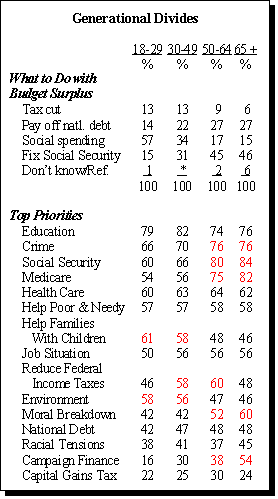Introduction and Summary
In his sixth State of the Union next week, President Clinton will face an American public that retains a healthy appetite for government activism — fully two-thirds advocate spending any budget surplus this year. But that enthusiasm is tempered by often sharp generational differences on federal spending priorities.
 In a clear signal about what not to do with any federal surplus, few Americans would use it to help pay off the federal debt more quickly (22%) and even fewer would devote it to a tax cut (11%). But those prepared to spend the excess revenue divide equally over how to do so: 33% favor new spending on such domestic programs as health, education and the environment; 32% support spending to make the Social Security and Medicare programs financially sound.
In a clear signal about what not to do with any federal surplus, few Americans would use it to help pay off the federal debt more quickly (22%) and even fewer would devote it to a tax cut (11%). But those prepared to spend the excess revenue divide equally over how to do so: 33% favor new spending on such domestic programs as health, education and the environment; 32% support spending to make the Social Security and Medicare programs financially sound.
Reflecting broader generational divisions on many policy issues, Americans under 50, particularly Generation Xers, would increase social spending, while older Americans would fix Social Security and Medicare. A similar generation gap is apparent on Clinton’s proposal to extend Medicare to Americans aged 55-64. Younger Americans heartily favor the idea, while a plurality of seniors oppose the proposal. As a result, public opinion is mixed: 51% favor the Clinton initiative; 41% oppose it.
While fixing Social Security and improving the educational system are high priorities for Americans of all ages, Social Security is No. 1 for those over age 50, while education tops the list for younger Americans. Older Americans also place a much higher priority than those under age 50 on dealing with the larger moral breakdown in the country and reforming the campaign finance system. Younger Americans are more likely to cite dealing with the problems of families with children and improving the environment. People aged 30-64 are particularly interested in reducing federal incomes taxes for the middle class.
These are among the most important currents in public opinion according to the latest Pew Research Center survey, conducted January 14-18. As the second session of the 105th Congress opens, the public expresses record levels of personal contentment and relatively high levels of satisfaction with the country. President Clinton’s approval stood at 61% in a poll conducted in part on the weekend of his deposition in a sexual harassment lawsuit. The poll also found good news for Congress: A lofty 66% of Pew Research Center respondents said that their representative deserves reelection.


